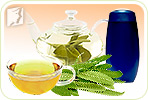When it comes to treating night sweats, being patient and determined is of the essence since their duration and severity can vary greatly. Luckily, the right attitude and strong will can bring women a step closer to living a symptom-free life.
Keep reading to discover the most effective night sweats treatments in order to determine the best approach to beating them once and for all!
Three Approaches to Treating Night Sweats
There are three night sweats treatment options available for women seeking to handle their night sweats, including: 1) Lifestyle Changes, 2) Alternative Medicine, and 3) Medications, ranging from the most natural to the most invasive ones.
Lifestyle Changes for Treating Night Sweats

Lifestyle adjustments are one of the simplest, yet most effective options for treating night sweats. While this approach is generally low cost and low risk, it demands the greatest amount of determination.
Nutritious Diet
During the menopausal transition, maintaining a well-balanced diet is an essential component of night sweats treatment. Daily meals should contain a combination of healthy fats, complex carbs, and lean protein that are abundant in the following nutrients:
- Phytoestrogens aid in balancing estrogen levels by mimicking the hormone's action, thus relieving night sweats.
Soy (tempeh, miso, tofu), beans, peanuts, broccoli, oranges
- Vitamin E protects the blood vessels to better relieve vasomotor symptoms, such as night sweats.1
Avocado, hazelnut, mango, wheat germ oil, salmon, trout, cod
- Vitamin B12 deficiency has been found to increase the rates of nocturnal sweating, though the exact mechanism is not understood.2
Seafood, yogurt, eggs, leans meats, legumes, soy, sardines
- Water that is lost from excessive perspiration due to night sweats should be replenished to avoid aggravation of the episodes. The goal is to drink six to eight glasses of water daily.
Moreover, avoidance of known food triggers, such as spicy or hot meals, is a good way to treat night sweats more effectively as they can make their episodes more frequent.
Regular Exercise
Research has shown that staying physically active is key to keeping reproductive and thyroid hormones in check, maintaining a normal weight, and improving temperature regulation in the body, all of which aid in relieving night sweats and hot flashes.3
- Amount: General recommendation is to get at least 150 minutes of physical activity weekly that can be broken into 30-minute routines, five times a week.
- Type: The biggest benefits from exercise are achieved when cardio workouts, like jogging or biking, are combined with those that strengthen musculature, like Pilates or yoga.
- Useful Tips: Women are advised to exercise earlier in the day to give their bodies a chance to cool down properly.
- Precautions: Any injury-prone or extreme exercises should be avoided; for women new to working out, it is better to start slowly with 10-15 minutes per day to prevent a sudden disruption of the body's metabolism.
Wholesome Habits
In addition to eating well and staying active, menopausal women can implement various wholesome practices to reduce the frequency and severity of night sweat episodes:
Creating a pleasantly cool bedroom environment prior to sleeping can effectively reduce night sweats episodes.Taking a cool shower right before bedtime can also lower the body's temperature to prevent night sweats.
Wearing loose and breathable nightwear as well as using moisture-wicking sheets, like bamboo or microfiber, can ensure comfortable and symptom-free sleep.
Quitting addictions to smoking and alcohol will reduce some of the main triggers of nocturnal sweats. Drinking caffeinated or sugary beverages at night should also be avoided.
Lowering stress through meditation or deep breathing can promote hormonal balance and prevent stress-triggered sleeping problems, thus reducing the frequency of night sweats and making sleep more restorative.
Alternative Medicine for Night Sweats

Carrying little to no risk, alternative medicine can directly address the root cause of menopause symptoms, hormonal imbalance, making it an extremely safe and effective way to alleviate night sweats, especially when combined with a healthy lifestyle.
Two of the most popular types of herbal supplements for night sweats include phytoestrogenic and hormone-regulating herbal supplements.
Phytoestrogenic Herbal Supplements
Phytoestrogenic herbal supplements, such as black cohosh, red clover, or dong quai, contain estrogenic components produced by plants. These herbs correct hormonal imbalances by introducing these estrogenic compounds directly into the body. However, as a direct result of adding outside hormones, the body can become less capable of producing estrogen on its own and in the long term, which causes a further drop in natural hormone production.
Hormone-Regulating Supplements
Hormone-regulating herbs don't contain any plant estrogens. Instead, they support women's natural hormone production by stimulating the endocrine glands. This ultimately brings about balance of reproductive hormones: estrogen, progesterone, and testosterone. These endocrine system-nourishing herbs, like Macafem, are considered a safe and effective way to treat night sweats since they do not introduce any outside hormones into the body.
From Nature and Health Magazine, Dr. Chacon says:
"Macafem's nutrients help restore natural hormones in women. Unlike hormone drugs, which are basically resumed in taking synthetic hormones, Macafem acts totally different in your body. It nourishes and stimulates your own natural hormone production by inducing the optimal functioning of the pituitary and endocrine glands." Click on the following link if you want to learn more about Macafem.
For many menopausal women, making healthier lifestyle choices and complementing them with herbal supplements turns out to be the most holistic and natural night sweats treatment. Yet, those suffering from severe night sweats might have to consider a more advanced line of treatment, namely pharmacology.
Medications for Night Sweats

This level of treatment involves the greatest risk and is commonly the most expensive. As such, its use is generally evaluated on a one-to-one basis and reserved for women with severe symptoms.
Nevertheless, conventional night sweats treatment might consist of the following medications:
Hormone Replacement Therapy (HRT)
For many years, the gold standard in the treatment for night sweats has been HRT, containing estrogen, progesterone, or both. While it can be effective and quick in treating menopause symptoms, including hot flashes and night sweats, therapy with hormones can increase the risk of blood clots, strokes, and heart disease, as is evident in the following study.
A comprehensive analysis on worldwide data on HRT's side effects has revealed a strong link between HRT and breast cancer, ovarian cancer, blood clots, and strokes. The findings were published in the 2002 edition of JAMA and were confirmed in a more recent meta-analysis of HRT use.4 This 2019 Oxford University study also discovered that the risks of hormonal therapy may persist for over a decade after its discontinuation.5
Other Medications for Night Sweats
Depending on the severity of night sweats and other accompanying symptoms, menopausal women might be prescribed medications that are normally used to treat other conditions, but have been found to reduce the episodes of nocturnal hot flashes. They include:
- Anti-seizure medications
- Low dose antidepressants
- Blood pressure medications
Studies have also shown that cognitive-behavioral therapy is effective for relieving nights sweats, hot flashes, and other menopause symptoms.6
The aforementioned three menopause night sweats treatments can be implemented gradually, starting from the least and moving towards the most invasive approach, only if necessary. Interestingly, an increasing number of menopausal women are finding that managing night sweats is best accomplished through a variety of healthy lifestyle changes combined with herbal supplements.
A Safe Treatment for Night Sweats
Implementing Lifestyle Changes:
- Opting for foods rich in phytoestrogens and vitamins E and B12
- Exercising early in the day for 30 minutes, 5 times a week
- Avoiding smoking, alcohol, excess coffee, or spicy food
- Adjusting bedroom temperature and wearing breathable fabrics
And Taking Herbal Supplements:
- Phytoestrogenic herbal supplements, like red clover and dong quai
- Or natural hormone-regulating supplements, like Macafem
Sources
- Cleveland Clinic. (2017). Night Sweats and Women's Health. Care and Treatment. Retrieved January 9, 2019 from https://my.clevelandclinic.org/health/symptoms/16562-night-sweats-and-womens-health/care-and-treatment
- Health Direct. (2018). Night sweats. Retrieved January 9, 2019 from https://www.healthdirect.gov.au/night-sweats
- Mayo Clinic. (2018). Night sweats. Retrieved January 10, 2019 from https://www.mayoclinic.org/symptoms/night-sweats/basics/definition/sym-20050768
- National Health Service UK. (2017). Night sweats. Retrieved January 9, 2019 from https://www.nhs.uk/conditions/night-sweats/
- National Health Service UK. (2018). Menopause: five self-help tips. Retrieved February 9, 2016, from http://www.nhs.uk/Livewell/menopause/Pages/Menopauseselfhelp.aspx
- National Institute on Aging. (2017). Signs of the Menopausal Transition. Retrieved January 7, 2016, from https://www.nia.nih.gov/health/publication/menopause-time-change/signs-menopausal-transition
Footnotes:
- Journal of Mid-Life Health. (2013). The role of oxidative stress in menopause. Retrieved January 30, 2020 from https://www.ncbi.nlm.nih.gov/pmc/articles/PMC3952404/
- Scottish Medical Journal. (2014). Vitamin B12 deficiency causing night sweats. Retrieved January 30, 2020 from https://journals.sagepub.com/doi/abs/10.1177/0036933014554875
- Menopause. (2010). Exercise training reduces the frequency of menopausal hot flushes by improving thermoregulatory control. Retrieved January 30, 2020 from https://www.ncbi.nlm.nih.gov/pubmed/27163520
- JAMA. (2002). Risks and benefits of estrogen plus progestin in healthy postmenopausal women: principal results from the Women's Health Initiative randomized controlled trial. Retrieved January 30, 2020 from https://www.ncbi.nlm.nih.gov/pubmed/12117397
- The Lancet. (2019). Type and timing of menopausal hormone therapy and breast cancer risk: individual participant meta-analysis of the worldwide epidemiological evidence. Retrieved January 30, 2020 from https://www.thelancet.com/journals/lancet/article/PIIS0140-6736(19)31709-X/fulltext
- Menopause. (2019). Cognitive behavior therapy for menopausal symptoms (CBT-Meno): a randomized controlled trial. Retrieved November 23, 2020 from https://journals.lww.com/menopausejournal/Abstract/2019/09000/Cognitive_behavior_therapy_for_menopausal_symptoms.6.aspx



